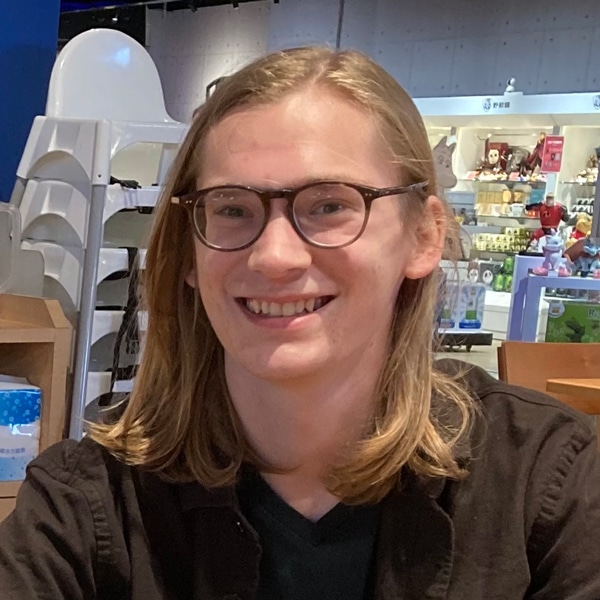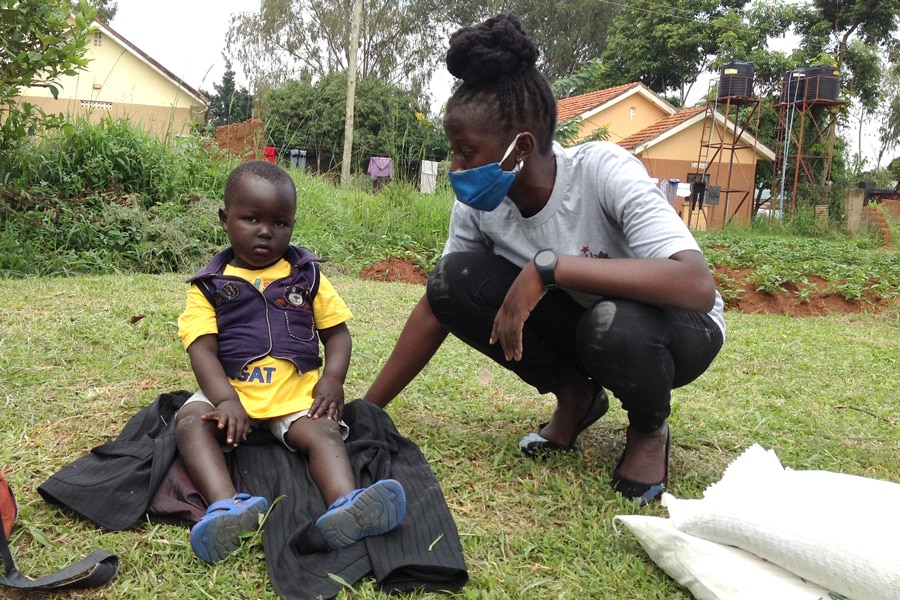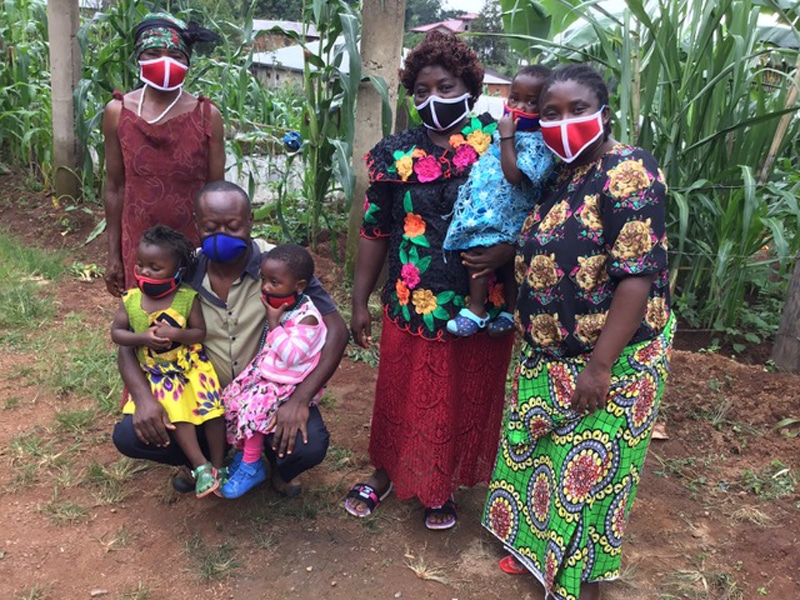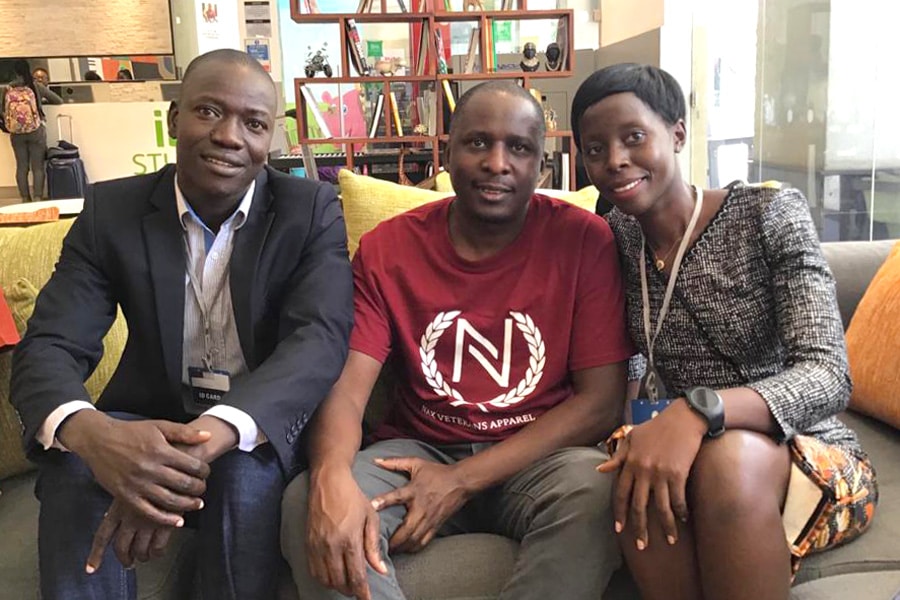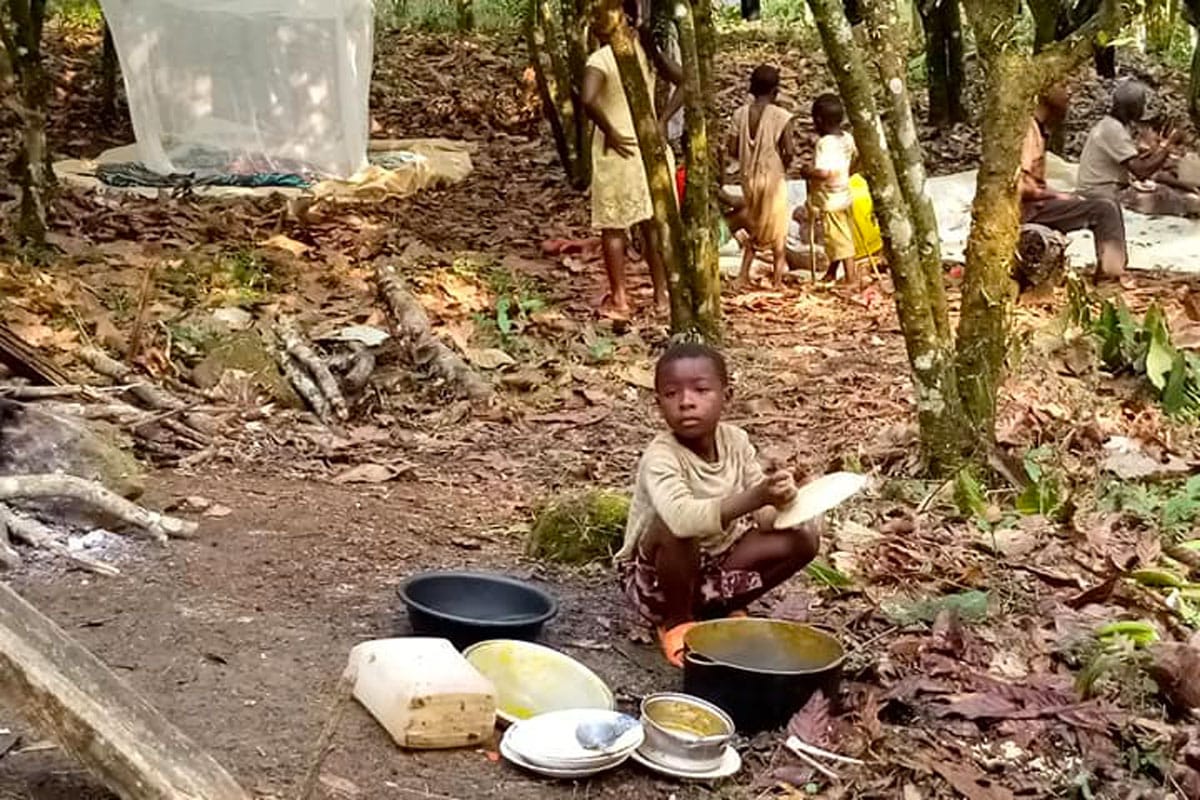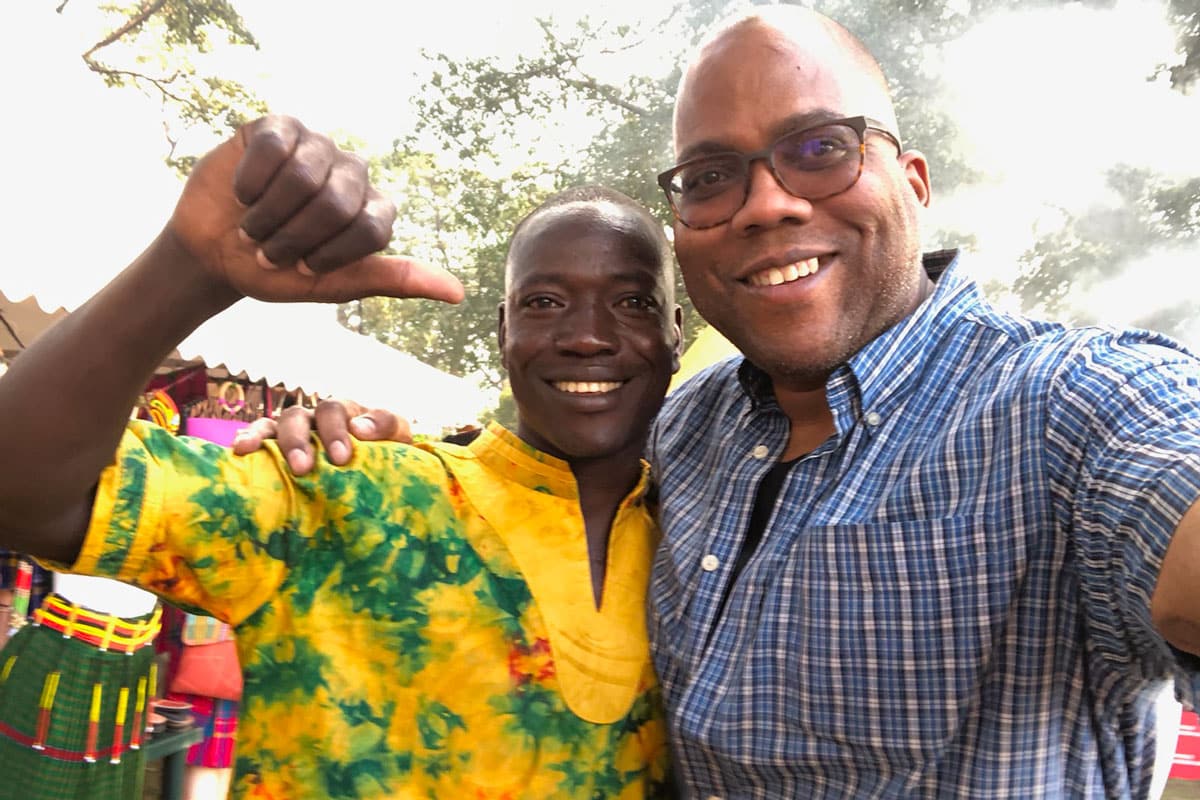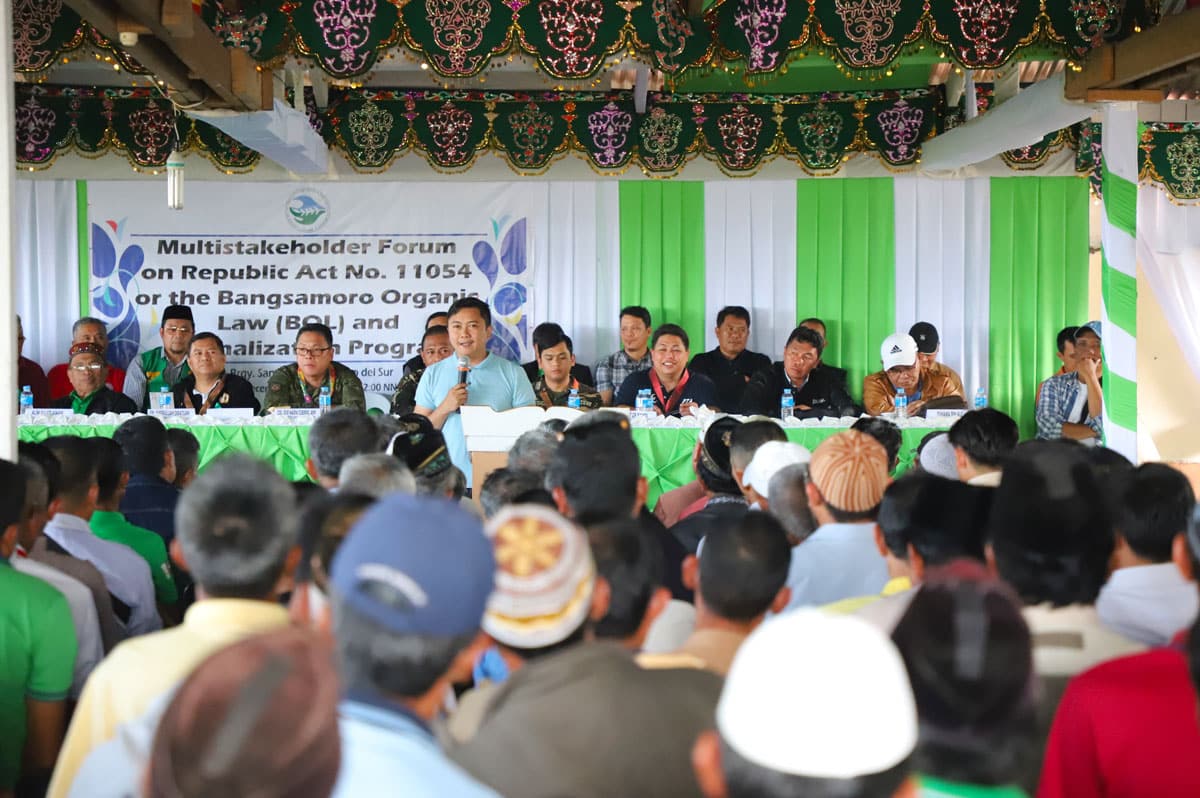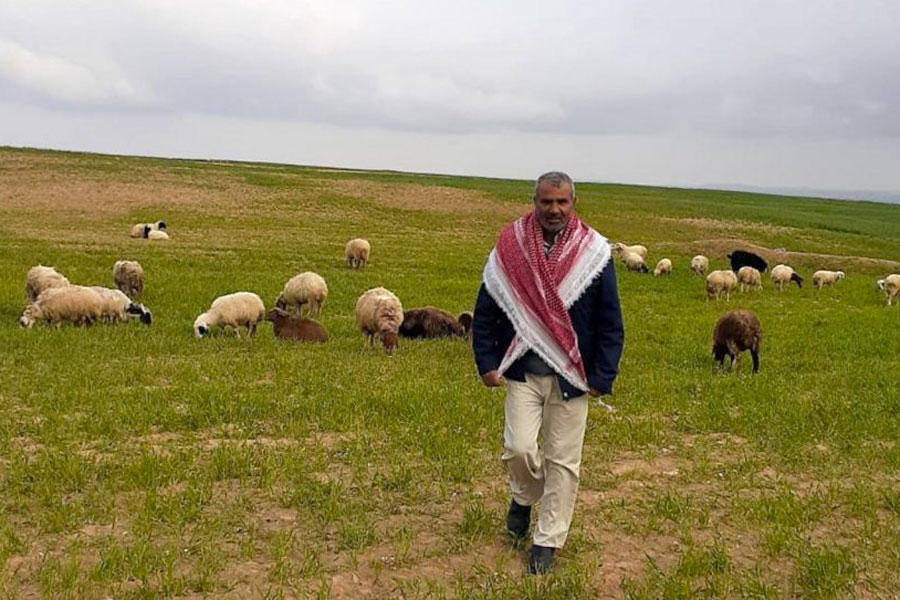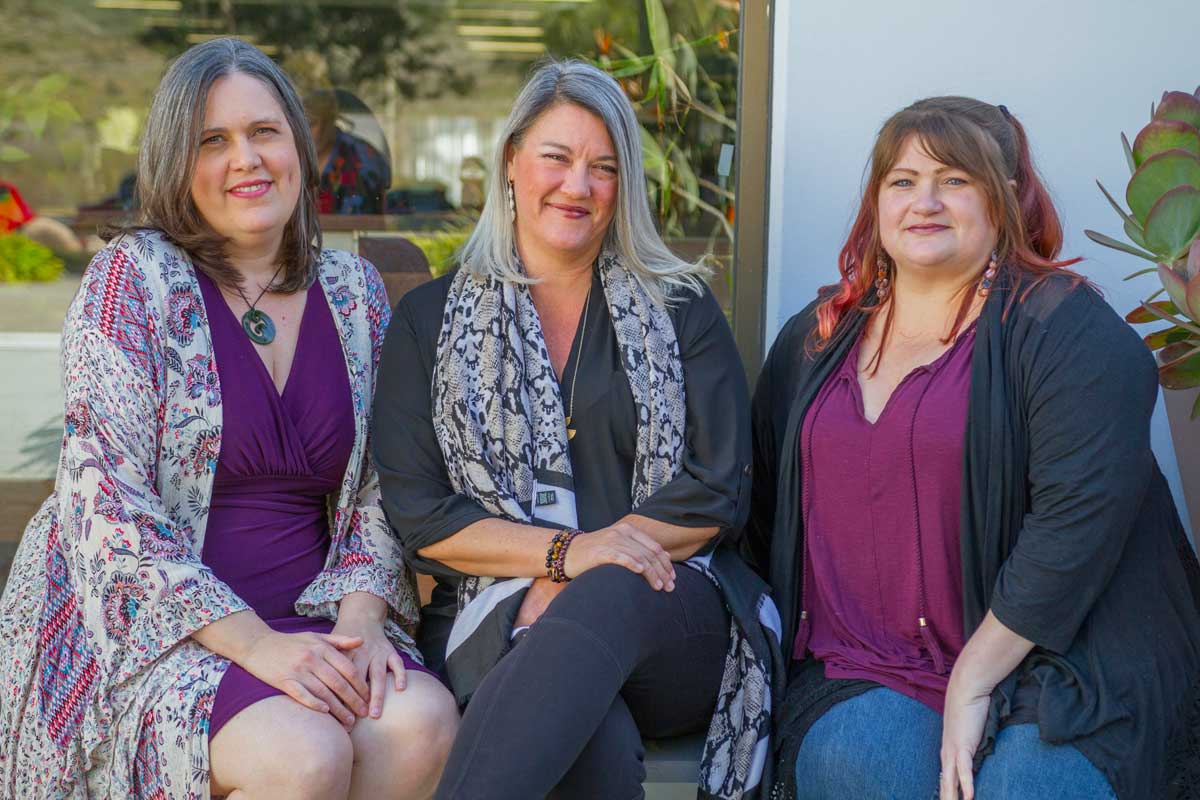Solidarity and Survival During COVID
By Yusuph Masanja, Co-Facilitator, Global Alumni Network
The Chicago Peace Fellows have tirelessly continued to find ways in helping families survive COVID. In the stories below, our Fellows, Jamila Trimuel, Dawn Hodges, and David Gonzalez are making a huge difference in South Side Chicago.
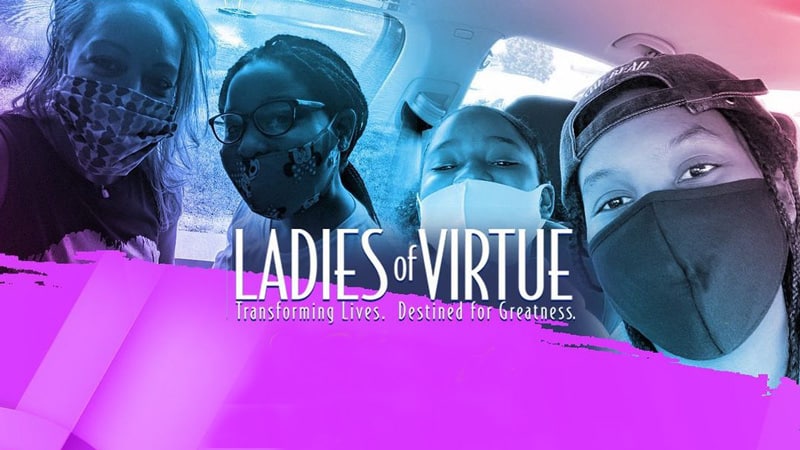
Chicago Peace Fellow, Jamila Trimuel, is a founder of Ladies of Virtue, an award-winning mentoring and leadership program that has empowered over 1,000 girls, ages 9 to 18, to become confident and purpose-driven leaders.
In 2020, Ladies of Virtue served the community with the support needed to survive the pandemic. They served 4,000 meals to 1,220 people in the community, they gave out school supplies, financial stipends, PPE and laptops for families.
We are so proud that we are not only serving the 200 girls we are serving this year but also over 1,000 community members. - Jamila Trimuel, Founder of Ladies of Virtue
This summer, Ladies of Virtue held their very first summer STEM program called “STEMuTiful". This program is a virtual summer experience promoting self-love, confidence, and beauty while increasing exposure to black women executives in the STEM and beauty industry. As a result, 84 percent of girls involved said the program increased their confidence and 100 percent of participants said that they learned more about STEM careers as a result of the program.
Jamila’s motivation to start Ladies of Virtue emanated from her own personal experience while in high school. She noticed some of the students, including her friends, were not planning for life after school. Having learned from constant encouragement from her parents to pursue her passion, Jamila knew that having positive role models in life to push you towards your dreams can really make a difference. So, while in college, she decided to become a mentor to help those students, to kind of push them along, and be a listening ear if needed. As she got older, Jamila realized that mentoring youth was her true passion, thus, she started Ladies of Virtue.
Go social with Ladies of Virtue this month to follow celebrations of the National Mentoring Month throughout January using #LOVChicago on Instagram, Facebook, and Twitter.
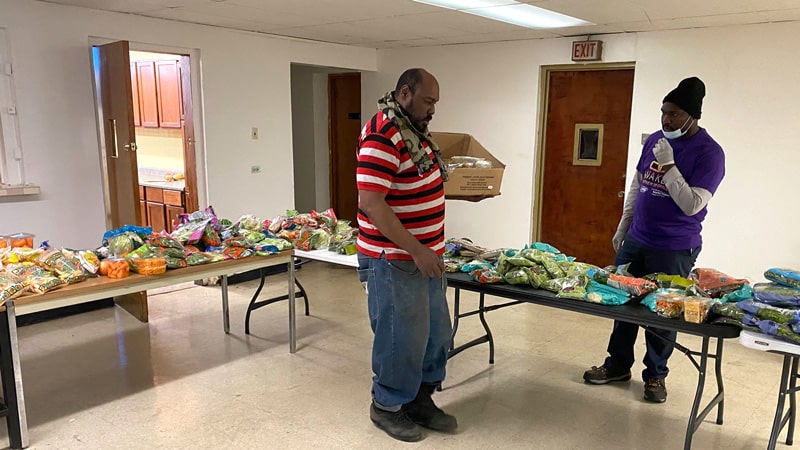
Dawn Hodges, Chicago Peace Fellow and the Executive Director at Imani Community Development Corporation is busy gathering and distributing as many resources as possible to neighbors in need. For over 40 years, the Imani community has been a pillar in the neighborhood, primarily focusing on mentoring, out-of-school programming, and food distribution.
Whatever is needed by the community we try to gather, that’s not our usual model but that’s what we do right now. We try to be of service to our community as much as we can. - Dawn Hodges
Dawn and her team provide monthly food distributions serving 200 families. COVID complicated their operations but they never stopped. Dawn and her team didn't miss a month in 2020, even with the pandemic. "We just kept going,” Dawn says.
As Dawn continues to gather and distribute resources, she is requesting any help that could be given to further support communities in need. More importantly, Dawn requests more and more prayers from us. The following quote from Marianne Williamson inspires Dawn and she shares it often with her peers:
Our deepest fear is not that we are weak. Our deepest fear is that we are powerful beyond measure. It is our light, not our darkness that most frightens us. We ask ourselves, who am I to be brilliant, gorgeous, talented, fabulous? Actually, who are you not to be?
Focus areas like, after school summer programs and mentorship for young men, are hugely affected. They recently conducted a virtual summer camp and continue to engage kids virtually, but it is challenging. Dawn says, “Now we do check-ins but it’s not the same, getting kids to focus on a call is a big problem.”
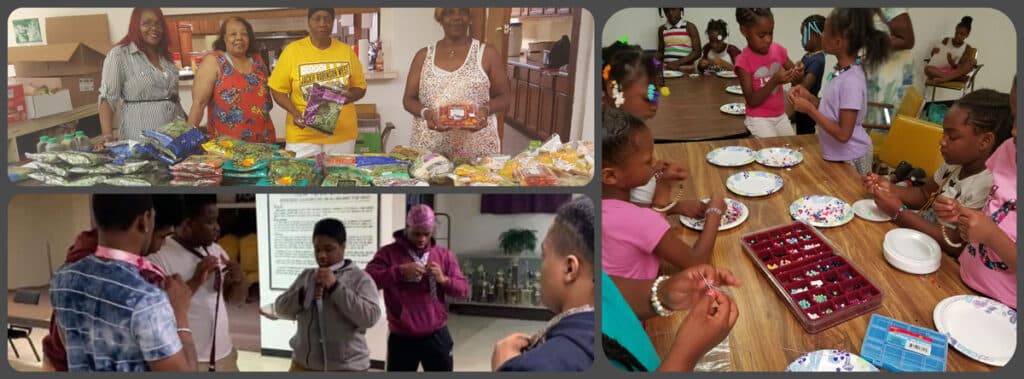
Chicago Peace Fellow, David Hommy Gonzalez, is the Executive director of Port Ministries, a non-profit in Chicago offering free clinic services, after school and food distribution programs. They also run art programs and the adult education program called the People's School.
David and his team had no idea how to get sandwiches donated anymore when the pandemic hit. They reached out to individuals and so many were willing to make sandwiches in their houses and leave it at their doors for a driver to pick up and donate. David found this to be an interesting way to allow people to volunteer from a place they are comfortable, their houses!
Our food provision had to adjust during the pandemic. We had to partner more. - David Gonzalez
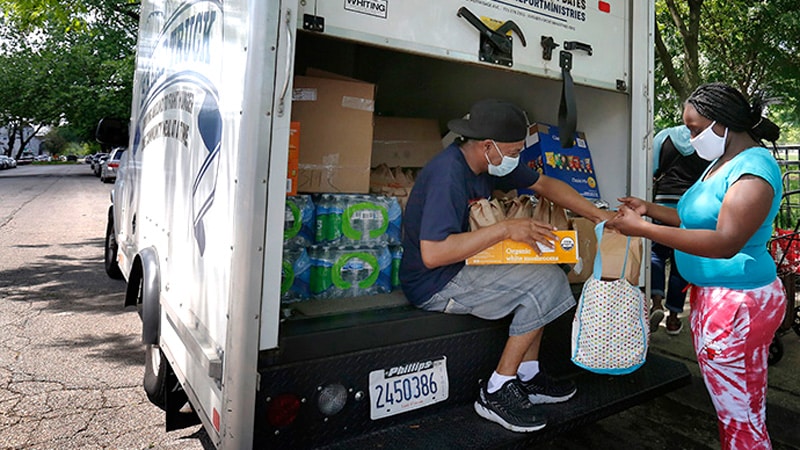
David owes the Port Ministries vision to his mother. He remembers being very poor in his hometown. His mother went hungry many times, buying food only for David but failing to provide for herself.
Now that I am educated and have a good position. It’s my responsibility to use that privilege to give our Mamas all the tools possible. I created that free clinic because I remember my medical struggle, I created the bread truck because I remember going hungry—you never forget what going hungry feels like. You never forget how it feels like to be homeless. - David Gonzalez
David manages expectations by surprising people with food during distribution. He is trying to avoid disappointment—in times when food is not available, but people still expect it to come. David says, “The one thing about hunger is that it comes back tomorrow, it is never fully solved. All we can do is keep throwing food at that problem and know that tomorrow it comes back. So, we spread out and go to different locations, it’s not like someone is surviving on us, we are trying to feed as many people as possible, and the moment they do survive on us there is a different program for that. Because that needs more attention.”
With his nonprofit, David is now collaborating with other Goldin Fellows in various programs, fitting in the puzzle pieces to really catch all the community needs. Using their truck, they assist in delivering food to elderly people in need. “If someone needs our help to deliver food, we got you,” David says.
Every One of Us is Better Than Any One of Us
By Yusuph Masanja, Co-Facilitator, Global Alumni Network
We want to teach young people how to be productive, we don’t just give them jobs! We ensure they can keep the jobs and grow to creating their own jobs
Raymond Richard, Goldin Global Fellow
Raymond emerged from struggles of homelessness, criminal activities and substance abuse to become a mentor, activist, and public speaker. He works tirelessly to decrease neighborhood violence and contribute to a safe environment for children and families across the United States. Driven by the urge to help young men and women become productive members of society, Raymond founded Brothers Standing Together (BST) in 2009, a year later after being released from his sixth incarceration.
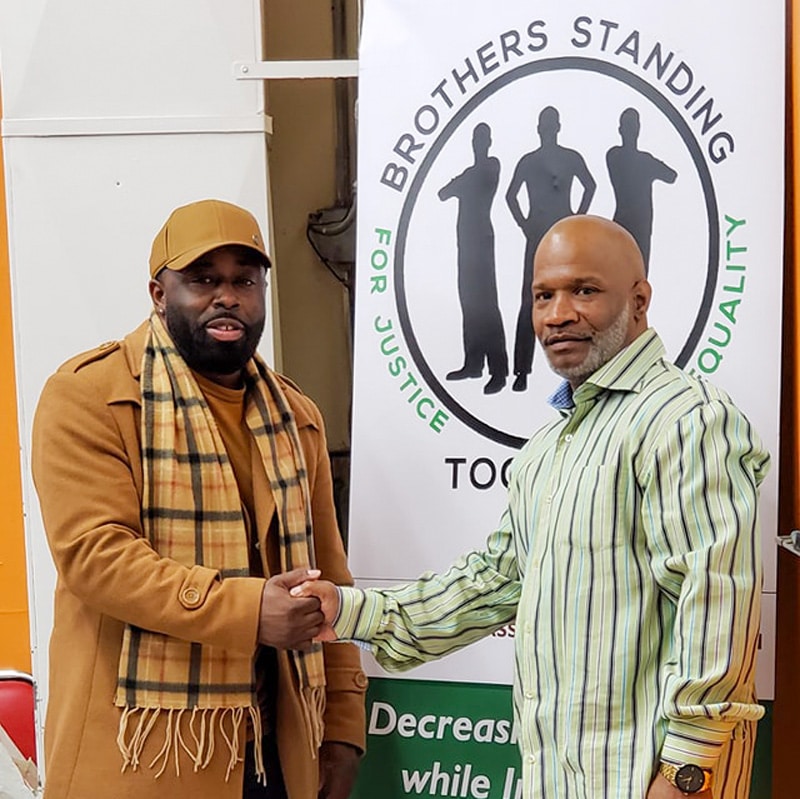
BST has empowered over 1,500 youth through different programs, including but not limited to, practical skills training such as carpentry, plumbing, welding, painting, bricklaying etc. Raymond provides lifelong traits that help youth find a purpose in life. BST programs also assist youth with obtaining Identity cards, birth certificates, license, housing, meals and employment.
“65% of young men in the city of Chicago don’t have IDs, every time they are stopped by police, they are labeled as John Does.” Raymond says.
BST is partnering with County jails to provide opportunity for community service work. At BST, Exemplary volunteers often get enlisted for available job opportunities. During the pandemic, it has become challenging for BST to reach youth, especially the homeless.
COVID has decimated our community outreach, I am often outside seeking job opportunities for our youth or speaking with youth because most of them are outside–you have to be grassroot to serve them better. It’s now difficult to reach out to those who are mostly likely to shoot or be shot, we try to keep communication open with caregivers and parents through emails.
With 15 staff, BST tries everything to reach more youth, but more help is needed. Ray shared, “With all the good help we provide, we don’t even have the help that we need, and that’s our struggle. That’s why I created the Brothers Standing Together LLC program in order to help the nonprofit.”
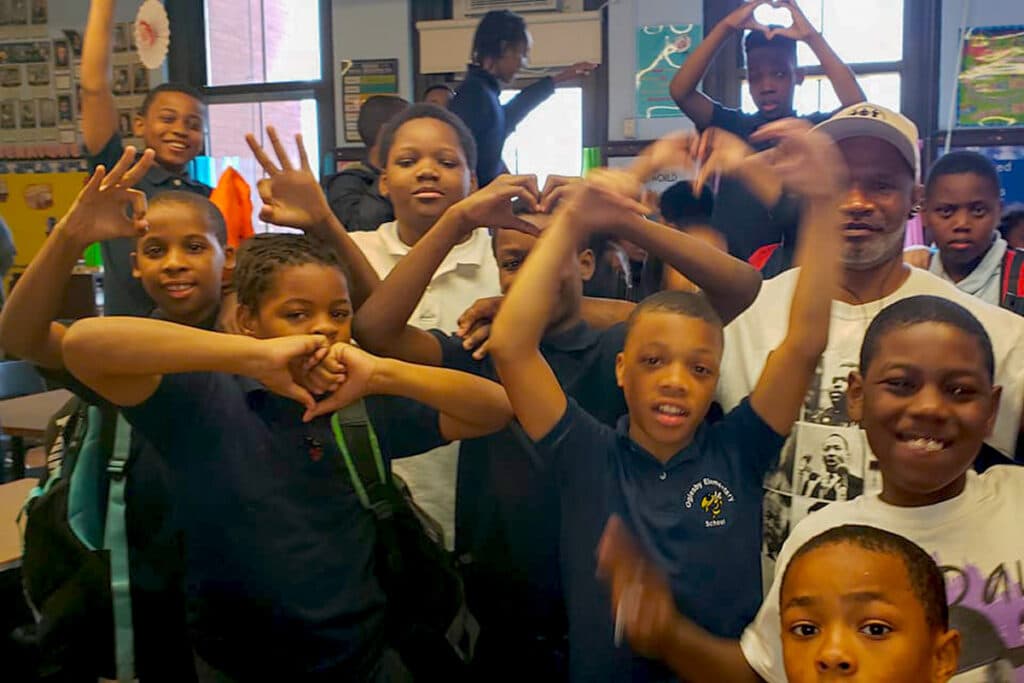
Raymond has been a strong advocate against the shootings of Tamir Rice, Mike Brown and Eric Garner. His advocacy work has been featured broadly on CNN and MSNBC media. Among other advocacy, he continues to lobby for a change of legislation affecting returning citizens, the term he advocates to be adapted for formerly incarcerated individuals, because the majority of them are now productive members of society like himself. To reiterate the puzzling question his mentor uses in advocacy, Raymond asks “Where do my wrong ends and my rights begin?"
Raymond calls on all Goldin Global Fellows to stay connected and united, because the struggle against violence is not only in America but worldwide. He would be happy to hear from any fellow interested in collaboration or needing any assistance that he can provide. He says “every one of us is better than any one of us” Brothers Stand Together needs us to keep them uplifted as they keep us uplifted.
YOLRED Provides Critical Supplies to Families Struggling to Survive COVID-19

When the COVID-19 pandemic hit Uganda in late March, most people who live from hand-to-mouth, saw their lives crumble as their businesses were closed and sources of livelihoods shut. According to the Youth Leaders for Restoration and Development (YOLRED) Program Director, Geoffrey Omony, a survey done by the organization early this July, and targeted at assessing the impacts of the pandemic on the Lord’s Resistance Army (LRA) survivors, revealed that many families were sleeping on empty tummies because they did not have food.

“Life has been really tough because the lockdown was sudden and the little food we had in the house could not sustain us for long,” Lilly Atong, one of the YOLRED's beneficiaries said in an interview, “The lockdown found me with ten children in the house yet I had no way to get money or food. The beads I made were not selling because my customers who are majorly foreigners coming to visit the country were no longer coming.”
Atong said even when she had just newly acquired additional skills in modern catering, she could neither establish a business because she did not have the capital, nor find employment since hotels were closed.

The Government of Uganda announced a lockdown in the country on March 23 where public transport, non-food businesses, places of worship and all forms of public gatherings were banned. A few days later, even private cars were banned from the roads and motorcycle riders were instructed to carry only luggage and no passengers as people were being encouraged to stay at home in a bid to curb the spread of the noble coronavirus disease.

To Jennifer Acan, a single mother of five, living with a disability following the amputation of her left leg, the sudden lockdown coupled with her disability, was disastrous.
We would go on empty stomach for several consecutive days, Acan said, Sometimes I would send the children to look for some wild plants so that we could boil and take.
But following the survey, YOLRED on Thursday, July 30, distributed emergency relief food, sanitary and educational materials worth over eight million Uganda shillings (about US$2,200) to at least one hundred of such starving families. The items included; 15 kilograms of maize flour, 10 kilograms of beans, packets of salt, two bars of soap, two pieces of cloth face masks and self-learning materials for their children.

“I am so glad that YOLRED thought of doing this for us,” Acan said, “At least I am sure that today I am going to eat and get satisfied. I thank YOLRED so much for standing with us. They are supporting our children in school and now doing for us this; we cannot thank them enough.”
To Kenneth Oyet, the food relief was a huge save from embarrassment, especially of a father being unable to feed his family.

“I watched with deep pain and embarrassment whenever my children would cry of hunger,” Oyet said, “Taking home these items will make me a man and father again. I would like to thank YOLRED and the people sponsoring it so much for caring about us.”
The food distribution was conducted at the YOLRED headquarters in Gulu, and witnessed by representatives from the Gulu District COVID-19 taskforce.
While addressing the beneficiaries, Felix Olanya, who led the two-man team from the taskforce, appreciated YOLRED for joining the Government of Uganda in supporting vulnerable groups within Uganda. He said, while the Government would have wished to serve everyone, its capacity was limited that was why groups like the LRA survivors did not get food relief.

Mr. Omony, said that, while they found overwhelming need from the general community, he was happy that YOLRED was able to provide those items to their beneficiaries.
As of July 30, Uganda had registered at least 1, 147 cases of COVID-19 infections and two deaths. But there is fear for a speedy spike in the number of cases and deaths as private and public transport return to the roads, businesses get opened and more people travel across the country.
In a special way, YOLRED and team would want to thank the team Goldin Institute and Carlotta Ludovica Passerini for supporting the LRA former child soldiers with life necessities and sanitary during this difficult time. Your support has been a lifesaving to our beneficiaries.
Thank You and Update from Cameroon

Dear friends and supporters,
Thank you to everyone from the global network that supported our efforts in Cameroon. As you may have seen on the news, the COVID-19 cases are rising in in Cameroon and our communities are doing our best to gear up to stay safe. Unfortunately, Cameroon is second only to South Africa in the number of COVID-19 cases. But thanks to your generosity, we have been able to purchase masks for young people, orphans and widows in two communities near Bamenda that were unprepared for the pandemic.

Unfortunately, the COVID-19 makes the other issues plaguing our community even harder to address. As I reported in my last update, the deadly clashes which have mostly been in the rural areas have led farmers to abandon their farms.

This have led to severe food shortages because local food sources are no longer available and global food chains are also disrupted because of the conflict. However, with you support, we were able to purchase fertilizers to restart the farming and purchase emergency foodstuffs for the internally displaced during this crisis.

Many problems show up in communities when times are hard. Your support also helped us do some other things that our community needed:
- we assisted a father that needed medical care for his leg
- we gave direct cash assistance to 6 families in crisis, and
- we continue to build self-sustaining and ecologically sound support for communities to help themselves.

On behalf of the community of Bamenda, Cameroon, thank you for your generosity and solidarity!
Sincerely,
Alexander Gwanvalla
GATHER Global Fellow and President, Community Green Engagement Cameroon
Prevention, Reintegration, and Healing of ex-Child Combatants in Northern Uganda

Early this year, I and Diana attended a two days’ workshop in Nairobi organize by the Antislavery Knowledge Network (AKN) with the aim to contribute to a critical conversation on modern slavery and the value of methods from the arts and humanities in addressing it.

In 2018, YOLRED had been awarded a one year large grant from AKN worth £40,430 for its art based project titled Bila Pi Kuc: Creative Art-based Therapies for the Prevention, Reintegration, and Healing of ex-Child Combatants in Northern Uganda. Additionally, the safeguarding project which also aim at promoting a process of dialogue on concrete practical measures that each of us in our different roles can take, individually and collectively, to promote good safeguarding practice at every stage of the international development research process was as well funded by the AKN.
Therefore, the workshop gave YOLRED the opportunity to share with its partners the progress and outputs of these two projects respectively.

Bila Pi Kuc had three major outputs:
- A community cultural festival which brought together over 500 people for a day of creative arts-based performances, with the aim of facilitating dialogue on several issues related to child-soldiery that were not addressed during post-conflict peacebuilding and remain overlooked even today.
- A graphic novel which amalgamated stories collected from in-depth interviews and oral histories with 25 former child soldiers to form one narrative. The graphic novel is available at: https://goldininstitute.org/graphicnovel.
- An animated film presenting the journey of former child soldiers, using the voices of the research participants as the narration.

The Graphic Novel, We are Not Free, has been widely distributed locally including over 50 schools, religious institutions and cultural centers. Through our partners in the UK, the novel has been shared through the University of Bristol website where is has been one of the top most viewd pages for the University (where the average time spent on the page is over 5 minutes). Our colleague Jassi shared the graphic novel in an interview on BBC Bristol and has been used by international organizations like War Child UK, Child Soldiers International and at a number of Universities across the country.
Globally, the Graphic Novel has been shared widely as well:
- Displayed at the UNFPA’s high-level Nairobi summit (ICPD25) in November 2019, which was attended by over 8000 delegates;
- Presented at the ISSOP’s annual meeting on Children in Armed Conflict in Beirut in September 2019;
- Shared with: universities in Europe, NGOs, policy offices;
- UN Children in Armed Conflict Unit
- New Humanitarian
- Child Soldiers Initiative (Canada)
- Justice Hub
- UN Security working group for children in Democratic Republic of Congo
Thanks to the success of this initiative, we have witnessed change or success in three primary areas:
- Confidence and Esteem: we have seen the beneficiaries involved in this project see themselves in the outputs and feel valued and their voices expressed
- Global Reach: More engagement with researchers internationally who have seen the comic and have reached out to Jassi or me about how to write about child soldiers in an ethical and positive way
- Community Cohesion: the cultural festival has brought together former combatants and non-combatants in a positive and non-judgemental space
On the other hand, the safeguarding project was created to address some of the issues around safeguarding and research practices in the region, so the safeguarding challenges and barriers were not necessarily specific to the project but instead relevant to the work YOLRED does.
The challenges to the safeguarding of former child soldiers and YOLRED staff (and to some extent the wider Northern Ugandan community) which were exposed during the focus groups included:
- Negligence in the way we conduct research and not considering local cultural and social values, for example international researchers dressing inappropriately, and asking questions which revolve around taboo subjects, such as sexual intimacy and killing. Most research agendas are driven by the researchers or the funders, with little importance given to the research desires of people in the region. Moreover, much research does not show the actual representation on ground, as researchers choose to interpret the data in a way which suits their agenda or research objectives.
- Exploitative and extractive nature of research, which takes from participants without providing any benefits in return. Most former child soldiers would agree that they are the ones benefiting the researchers, as their stories are providing the researchers with careers and salaries. Moreover, the lack of compensation for people’s time, including YOLRED’s and other NGOs involved in research projects, fails to address the neo-coloniality of research projects such as the ones active in international development research. Language for direct communication between researcher and the former child soldiers has always been a challenge too as most former child soldiers do not speak English, and as a result are unable to access the language of the researcher but also their research outputs.Rushed nature of data collection: the time frame and approach of researchers whereby they come for few days and want to get enough information for their research and put a lot of pressure on participants and NGOs they are working with. Due to these time limits, they also do not sometimes vet the people they are working with and sometimes research assistants are not credible (i.e. some people invite their friends or relatives to work as research assistants). They also ignore the component of creating a rapport with the participants and do not interact much with people locally. Doing the interview from the participant’s home gives alertness to the community members about their status of being former child soldiers.
- White Savior Syndrome where people see everything about “white people” as being good and their expectations are always high.

In response to these various concerns, we wanted to document what practices former child soldiers themselves felt were harmful, exploitative, and negatively impacting them within current research practices. We therefore held 3 focus group discussions with 33 former child soldiers and then a stakeholder workshop, to explore what community leaders believed were issues with research practices. And, after carrying out the data collection, we confirmed that they are continuing to suffer from unequal and exploitative research practices, as described above, but even more strongly than we had presumed (for example, we did not realise that most of them believed that YOLRED was financially benefiting from researchers engaging in these projects though them, when the truth is that YOLRED actually is not compensated for their time and only engages with researchers due to feelings of obligation as well as hope that they can bring some change).
Following this, and through working with the community groups and former child soldiers, we were able to update YOLRED’s safeguarding policy with this new information forming an integral part and produce an internal policy for YOLRED. We have used these new protection protocols to educate YOLRED staff about the harms felt by former child soldiers within research processes (as the team were present during the focus group discussions and listened to the concerns of the groups we work with) and engage with a range of stakeholders on safeguarding issues and shared the information we had obtained during the FGDs with our wider network. We are currently producing a report on the findings, with a set of guidelines on how researchers can operate more ethically in the region.
This is part of a collaborative project between YOLRED (Uganda) with Jassi Sandhar (University of Bristol) and the Goldin Institute. This project, titled “Bila Pi Kuc: Creative Art-based Therapies for the Prevention, Reintegration, and Healing of ex-Child Combatants in Northern Uganda”, is generously funded by the Arts and Humanities Research Council through the Anti-Slavery Knowledge Network (as part of the Global Challenges Research Fund).
After the workshop, we were exhilarated to meet our own Global Alumni Geoffrey Waringa and really we had a wonderful conversation with him.

Caught between Two Wars

Over the past four years, I have painfully witnessed my country of Cameroon be ravaged by a steadily escalating war which has displaced thousands of civilians internally, and into neighboring countries. As the president of Community Green Engagement (COMGREEN), I and my colleagues have strived to ensure the communities which we serve not only have sustainable access to food, but also engage communities on existential climate change issues.

In the current period, we have been forced to watch, helpless to prevent the entire destruction of villages because of the fighting. Many flee to places such as Bamenda, where Community Green Engagement has its headquarters. run to the major towns like bamenda where we have our headquarters. Unrelenting gunfire and the sincere risk of interpersonal violence by warring groups makes it nearly impossible for us to work.

Further, due to the deadly clashes which have mostly been in the rural areas, farmers and ranchers have abandoned their properties leading to drastic food shortages. Now, the consequences of the COVID-19 pandemic are upon us as well. Though we have few confirmed cases of virus infection, like too many countries throughout Africa and around the world we struggle with rigorous medical testing for the disease. Additionally, the police and military are seizing the opportunity offered by the pandemic to further restrict civilian movement by enacting curfews, and deep fines for those who are outside of their home without official permission, or subjectively valid reasons. Some have been beaten for these reasons as well.
With the support of the Goldin Institute. Community Green Engagement is launching a FaceBook fundraising drive to secure foodstuffs and livestock for Bamenda and the surrounding areas we serve.

It is a very difficult time for us here in Cameroon, but Community Green Engagement continues to offer resources, training and hope. Before the fighting in Cameroon, between Anglophone and Francophone factions, COMGREEN maintained a beekeeping project, gardening, and oversaw the construction of a community center through regular civilian-focused consultations, Many stakeholders came together to discuss our most pressing problems and collectively come up with solutions. We pray the time will come again soon when we can resume such inspiring outcomes, again.
Click Here to Support the Community in Cameroon
Transitions for our Director of Community Learning and Collaboration

This may not be my final contribution to the Goldin Instiute’s newsletter, but to be sure it is the most difficult to write.

After six years, I am leaving Goldin Institute to work with the Skoll Foundation in northern California. In my new role as a Principal of the foundation, I will help oversee grantmaking to social entrepreneurs throughout the world, as well as support collaborative funding efforts to better reach communities most in need.

Since the outset of my tenure at the organization, I have been blessed to not only gain a brother in arms and lifetime friend in Travis Rejman, but also get to know and work alongside some of the most dynamic, seemingly tireless people I’ve ever had the opportunity to meet. With no small degree of sadness, I will miss them profoundly.

The vision shared by Diane Goldin and Travis Rejman is one that captured my imagination with its raw clarity as well as its polished authenticity when I first learned of the Goldin Institute, and it still does. From my view at Skoll, I am committed to supporting that vision and the work of my colleagues to the fullest of my capacity.

To the larger community it has borne, I do hope I will still be seen as treated as a member, and ally. Though I will not formally be a part of the Goldin Institute’s working team I remain very active in supporting the individual efforts of its fellows and global partners, including the monthly roundtable dialogues.
Progress in the Peace Negotiations in the Philippines

The Comprehensive Agreement on the Bangsamoro (CAB) signifies a great milestone of peace negotiations over decades of talks in the Bangsamoro region in southern part of the Philippines. It is significantly the compilation and sum total of all the agreements, declarations, joint statements, principles and mechanisms reached and agreed upon between the government and the Moro Islamic Liberation Front (MILF) from the start of the peace talks in 1997 up to March 2014.

The principles of the negotiation recognized the justness and legitimacy of the cause of over 3,256,140 Bangsamoro people, their aspiration for the meaningful autonomy through a democratic process, the aim of finding a solution to the Bangsamoro question with honor, justice and dignity and the aim to end the fighting between the government and the MILF. The Bangsamoro Autonomous Region seeks to replace the Autonomous Region in Muslim Mindanao (ARMM) with a political entity that shall possess broader powers to address the decades-long aspiration of the Moro people for meaningful self-rule over their ancestral homeland, and that is where the Bangsamoro government now.
The Bangsamoro Organic Law realized another step to continue the infrastructure of peace process as stated in the CAB. This is to put in place and frontline the clear roadmap that will provide direction to transitional justice and reconciliation measures for the Bangsamoro struggle. It serves as mark of the commitment for peace as it proposes conflict transformation mechanisms on the ground.

The existence of normalization bodies in the CAB ensures human security and helps build a society that is committed to basic human rights where individuals are free from fear of violence and long held traditions and values. Under of which is the Joint Normalization Committee (JNC) which undertakes the process of normalization, Joint Peace and Security Committee (JPSC) that develops policies and operational guidelines for the effective partnership of the JPSTs and Joint Peace and Security Teams (JPSTs) as working for the maintenance of peace and order and the stability of the areas mutually identified by the GPH ( refers to Government of the Philippines) and the MILF. On the other hand, Independent Decommissioning Body (IDB) is mandated to oversee the process of decommissioning of the MILF forces and weapons.
The socio-economic programs were intensified on development efforts for rehabilitation, capacity building initiatives, reconstruction and institutionalizing programs to internally displaced persons (IDPs), and poverty-stricken communities. The Joint Task Force for Decommissioned Combatants and Their Communities (TFDCC) was established also to assist the panel to identify and implement socio-economic priorities and development projects for decommissioned MILF combatants and their communities.
The ceasefire mechanism including the Coordinating Committee on the Cessation of Hostilities (CCCH), International Monitoring Team (IMT) and Ad-Hoc Joint Action Group (AHJAG) are collaboratively working in the commitment to a general ceasefire necessitated to the ongoing peace talks and in the ironing out security issues and concerns in accordance with the security protocols agreed between the GPH and MILF. These are the on-going work and established commitment of both parties that will be reinforced its implementation.
There would be struggles in the transition period.
Lo Ivan Castillon
But, the pressing support and collaborative participation of international community to the Bangsamoro government provides significant account on the covenant established and put in place the sincerity of the government leaders to pursue it. There would be proactive and reactive measures in accompanying the transition phase, education, continuing campaign against potential bottleneck and organized working group to explore alternatives.
This would be an opportune time for the Bangsamoro leaders to serve and govern the Bangsamoro community as to ascertain their confidence and capacities on moral governance in responding to basic needs, reducing poverty, bridging social gaps, eliminating anti-social activities, improving human security, improving peace and enhancing unity within the territory.
Opportunities offer to challenge various stakeholders and sectors in government, private and civic organizations to work hand in hand in developing different conceptual issues, methodologies, analytical language and institutional practice and strategic approaches on theory and practice of moral governance in the Bangsamoro government.
The future leaders and general public are called for their active involvement in the exploration of the existing and potential linkages in support to Bangsamoro homeland. Moreover, there is a need to strengthen advocacy on peacebuilding, culture of peace, conflict transformation, active non-violence and peace process as long-term goal through series of campaigns, public consultations, fora, research and information and education campaigns among others. This will provide venue in acquiring rich knowledge, experiences and insights of diverse educational communities to benefit mutually through collaboration and solidarity among all stakeholders.
The processes are not just aiming to have the absence of war but are aiming to have a society wherein social justice prevails, economic system creates equal opportunities to all, ecological balanced establishes, respect and honor for uniqueness of one’s culture, traditions and beliefs and development of full human potentials made available.
Indeed, the CAB is the achievement of the present government that concludes the 16th congress and showcased its relevance to peace process and to the Bangsamoro government. As Bangsamoro, there are more to do, more opportunities to grab, more collaborations to link with, and more advocacies to work on towards the Bangsamoro aspirations to have shared vision (with the national government for national unity and reconciliation and within the Bangsamoro for peace and economic stability), shared leadership, good governance, improved peace and security, adequate and proper management of resources and more inclusive dividend of peace.
Responding to COVID-19 in the Bedouin Community

As a minority group within Israel, the Bedouin Community has had a long history of strife in dealings with the Israeli government. During these dire times of Covid-19 the government has failed in many areas to support Negev Bedouins through funds resources and information. As a result many families have been facing unemployment, health and communication concerns. Students who do not have computers can’t do school from home households with over ten people are having trouble with social distancing and unrecognized villages are unable to maintain a sanitized environment due to limited water.
A New Dawn in the Negev has been taking action in three areas:
- Established an emergency Covid-19 Hotline for receiving calls from those in need of urgent care and assistance;
- Proactive outreach through our call-center, managed by our staff and volunteers, to reach out to those that might feel apprehensive or afraid to cross social norms; and
- Building an online platform, still in process, that will generate opportunities to share initiatives, hold discussions and promote peer to peer volunteer ideas.
Through all these approaches we provide both structural and culturally-sensitive opportunities to express their needs and find responses based on solidarity.

[quote]A New Dawn is actively involved in the fight against Covid-19, and our work is effective because we have trust and local knowledge earned over years of experience working with vulnerable communities.[/quote]
We are more than happy to share our knowledge and experiences and coach other organizations who are facing similar situations and obstacles with social-governmental tensions. By working together, we can become stronger and more equipped for our work indivually and collectively. A New Dawn in the Negev is always seeking new connections for resource building and sharing.
A New Dawn’s biggest obstacle now is infrastructure and resources for our current endeavors. We’re working on a phone switchboard, computer tablets, hot line operating software and other activities, as well as an Internet platform via WhatsApp to build online community, and subscribing to an existing platform while adapting to the specific needs of the Bedouin company and training a limited team of operators.

We need to urgently respond to this crisis today, but we also have to rethink our work for the future.
Even before the coronavirus hit our community, our organization was often short on resources, facing neglect from the government, and having to deal with already high unemployment rates and poverty. Now the Coronavirus has given us no choice but to quadruple our efforts and prioritize our programs. We have to safeguard our infrastructure and make it adaptable to the new social norms of social distancing. Before the crisis, meeting people and engaging with them was paramount. Now, we have to apply all our work to a virtual world.
For our community as a whole, the crisis has impacted our way of life and culture. Now more than ever, cultural competency plays a role in the future of our people; we must not forget who we are.
During this time, we have grown virtually connected with our world more than ever before. Our experiences are in need of being shared to others through this heightened medium of communication. Connecting to my network of Global Fellows is critical in this time of physical isolation and the Goldin Institute is definitely one of our greatest partners. We wish to strengthen our ties with all the alumni and otherpartners to build a better future together.
READ MORE:
- https://fathomjournal.org/fighting-back-against-covid-19-in-the-bedouin-community/
- https://www.makorrishon.co.il/news/213227/
- www.b7net.co.il
- https://www.facebook.com/watch/?v=218873629470984
Veterans of Crisis, Shyne’s Survivors Swing into Action

Shyne San Diego enters day 22 of self quarantine for all team members as the day breaks with news of another rescue placed safely in a hotel, a young woman experiencing mental distress safely in a hospital, and letters clipped to the mailbox filled with emergency supplies ready to be shipped.

Here on the frontlines of human trafficking, Shyne San Diego was well positioned for the COVID-19 emergency regulation orders from the start. With central operations already running remotely, we held a community vision summit via Zoom on St. Patrick's Day. Shyne is operated by a network of survivor advisors and leaders, all of whom have experienced economic disparity, freedom restrictions, emotional abuse, physical abuse, and a lack of resources. COVID-19 exacerbates these issues outwards into our communities, but gratefully, this team knew how to respond.
Cynthia Austin, the founder of Shyne San Diego, is an inaugural GATHER Fellow, who has spent the last two years nurturing asset-based community development measures locally. Shyne had in place emergency response protocols, needs assessments, coordination platforms, and the community connections necessary to mobilize their team within hours of the mandatory quarantine. The teams use Zoom regularly to train, meet and support each other, Voxer to coordinate on the ground efforts, and shared Google Drive to track impact. Monitoring community impact is a critical step in their operations. In three weeks, trends have emerged. They are seeing very quickly an increase in needs for mental health support, work options from home, rent, cell phones, internet and basic home supplies.

In response, Shyne San Diego partnered with survivor-owned nonprofit Victory Garden Sanctuary to launch the first Survivor Advised COVID-19 Fund. Shyne's innovative, bold and candid reputation has gotten them the attention of the California District Attorney's Association, Civilization Research Initiative, and community volunteer organizations. Cynthia and her team of survivor advisors are assisting with research, funding solutions, survivor-led outreach, social media awareness campaigns, equipment for hospitals, and economic strategies to weather the months ahead.

COVID-19 impact on our global community is profound and swift. Each of us have a role in minimizing the impact of COVID-19 in our communities. Resiliency is an attribute survivors of exploitation possess that's extremely valuable in overcoming difficult times. Their ability to balance tragedy with action is crucial for making quick decisions within organizations, families, communities and personal lives. Cynthia asked her team, "What is your personal responsibility with responding to this crisis?" She then told them that one’s "respond-ability" is now measured by four areas: (1) able (2) necessary (3) practical (4) meaningful. You can do the same. Let's unite the fight against COVID-19 as a community of care.
Shyne San Diego
Women's Grassroots Leadership & Professional Development
"Ending exploitation by building a network of survivor owned & operated businesses."
Twitter @shynesandiego
Instagram @shynesandiego
